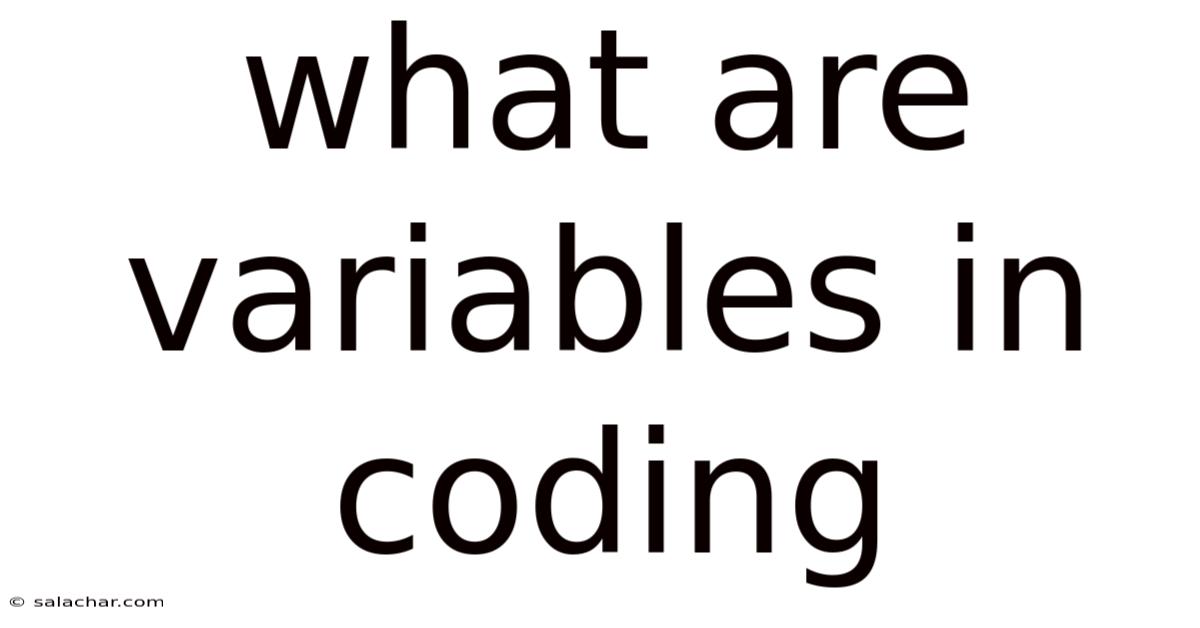What Are Variables In Coding
salachar
Sep 11, 2025 · 7 min read

Table of Contents
Understanding Variables in Coding: Your Foundation for Programming Success
Variables are the fundamental building blocks of any program. They are essentially named containers that hold data. Understanding how to declare, use, and manipulate variables is crucial for any aspiring programmer, regardless of the programming language they choose. This comprehensive guide will explore variables in detail, covering their purpose, types, scope, and best practices, equipping you with a solid foundation for your coding journey. We'll delve deep into the "what," "why," and "how" of variables, making this concept clear and accessible to beginners while also offering insights for those with some programming experience.
What are Variables? A Simple Analogy
Imagine you have a box. You can put things into this box – apples, oranges, toys, anything. In programming, a variable is like this box. It has a name (like "fruitBox"), and you can store information inside it. That information could be a number (like the quantity of apples), a word (like "apple"), or even more complex data. The key is that the contents of the box (the value of the variable) can change over time, hence the name "variable."
Declaring Variables: Giving Your Boxes Names
Before you can use a variable, you need to declare it. This means giving it a name and, in some languages, specifying the type of data it will hold. The syntax for declaring variables varies across programming languages:
- Python: Python is dynamically typed, meaning you don't explicitly state the variable's type. You simply assign a value:
my_integer = 10
my_string = "Hello, world!"
my_float = 3.14
- Java: Java is statically typed, requiring you to specify the data type:
int myInteger = 10;
String myString = "Hello, world!";
double myFloat = 3.14;
- JavaScript: JavaScript, like Python, is dynamically typed:
let myInteger = 10;
let myString = "Hello, world!";
let myFloat = 3.14;
- C++: C++ is statically typed:
int myInteger = 10;
std::string myString = "Hello, world!";
double myFloat = 3.14;
The naming conventions usually involve using descriptive names (e.g., userName, productPrice) to improve code readability. Most languages have rules about valid variable names – often they must start with a letter or underscore and can contain letters, numbers, and underscores.
Data Types: What Kinds of Things Can You Store?
Variables hold data, and the type of data determines what operations you can perform on it. Common data types include:
- Integers (int): Whole numbers (e.g., 10, -5, 0).
- Floating-point numbers (float, double): Numbers with decimal points (e.g., 3.14, -2.5).
- Strings (str): Sequences of characters (e.g., "Hello", "Programming is fun").
- Booleans (bool): Represent truth values (
trueorfalse). - Characters (char): Single characters (e.g., 'A', 'b', '
Latest Posts
Latest Posts
-
What Does Non Homogenized Mean
Sep 11, 2025
-
Is Steel A Homogeneous Mixture
Sep 11, 2025
-
Label Parts Of A Chromosome
Sep 11, 2025
-
Explain Overloading Of Household Circuit
Sep 11, 2025
-
What Do Pet Lizards Eat
Sep 11, 2025
Related Post
Thank you for visiting our website which covers about What Are Variables In Coding . We hope the information provided has been useful to you. Feel free to contact us if you have any questions or need further assistance. See you next time and don't miss to bookmark.